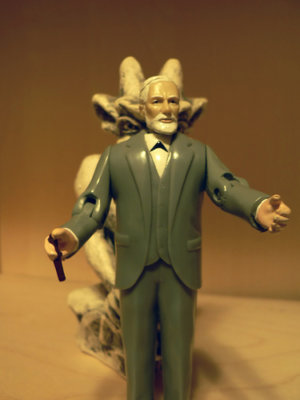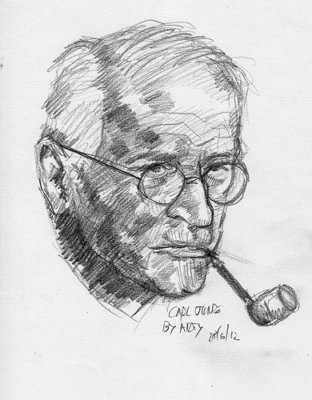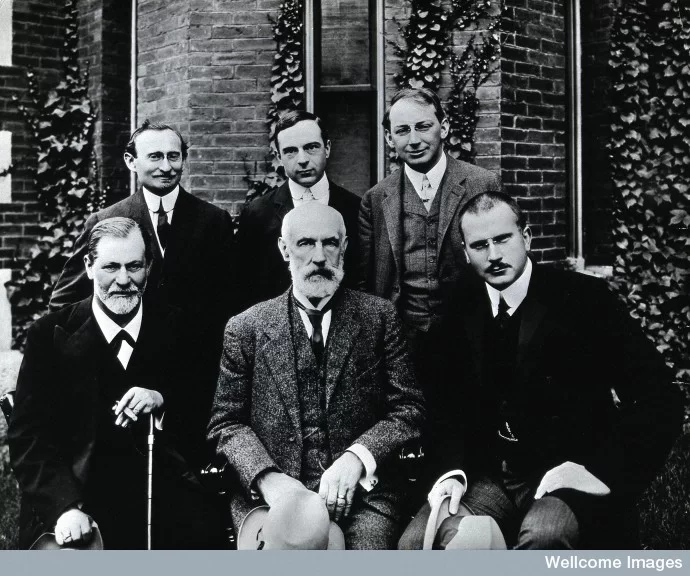Freud vs Jung – Similarities and Differences
One repays a teacher badly if one remains only a pupil. And why, then, should you not pluck at my laurels? You respect me; but how if one day your respect should tumble? Take care that a falling statue does not strike you dead! You had not yet sought yourselves when you found me. Thus do all believers — Now I bid you lose me and find yourselves; and only when you have all denied me will I return to you.
(Nietzsche Quoted by Jung to Freud, 1912)
To many, Carl Jung and Sigmund Freud defined the world of psychology. Their theories, although differing, have had the greatest impact on our perception of the human mind, and their contributions to theory and practice have led to the development of successful psychological treatments for the wide spectrum of human distress.
Yet their paths were not always so different. At the beginning of this colourful history was a friendship, a camaraderie based on intellectual prowess and impassioned desire to further the study into the unconscious psyche. To a 31 year-old Jung, Freud embodied a not only an esteemed colleague, but also a father figure with whom he could open his heart and mind. Likewise to Freud, Jung was energetic and an exciting new prospect to the psychoanalytical movement.
But this power dynamic changed, and along with it their friendship. In a case of the student becoming the teacher, by the time of his break with Freud in 1913 Jung was internationally known for his own contribution to psychological theory. What was the cause between their intellectual break, and where did their differences lie? In the battle of Freud vs Jung, was there a winner?
Sigmund Freud in Brief
Sigmund Freud, born Sigismund Freud, was an Austrian neurologist born on the 6th May,1856, in a small town named Freiberg, Moravia (now the Czech Republic). Although raised by a relatively poor Jewish family, Freud planned to study law at the University of Vienna. He later changed his mind and opted for medicine. Upon graduating, Freud began work in a psychiatry clinic in the Vienna General Hospital .

By: Enrico
Psychiatry at this time took no interest in the psychological components of mental health, but simply viewed behaviour in light of the anatomical structures of the brain. After spending four months abroad on placement in the Salpetrière clinic in Paris, Freud began to harbour an interest in “hysteria”, and particularly the hypnosis methods of its leading neurologist, Jean Martin Charcot. Upon his return to Vienna, Freud left the General Hospital and set up a private practice specialising in “nervous and brain disorders”. Along with his colleague Joseph Breuer he began exploring the traumatic life histories of clients with hysteria, leading to the view that talking was a “cathartic” way of releasing “pent up emotion”. Breuer and Freud together published “Studies on Hysteria” (1895) and began to develop the ideas that led towards psychoanalysis.
It was about this time that Freud began his own self-analysis, meticulously analysing his dreams in light of unconscious processes culminating in his next major work “The Interpretation of Dreams” (1901). Freud had by now also developed his therapeutic technique of free association and was no longer practicing hypnosis. From this he went on to explore the influence of unconscious thought processes on various aspects of human behaviour and felt that amongst these forces the most powerful were the sexual desires in childhood which were repressed from the conscious mind.
Although the medical establishment as whole disagreed with many of his theories, in 1910 Freud, along with a group of pupils and followers, founded the International Psychoanalytic Association, with Carl Jung as president .
In 1923 Freud published “The Ego and the Id”, revising the structural make-up of the mind. By 1938 and the arrival of the Nazis in Austria, Freud left for London with his wife and children. However, throughout this time he was plagued by cancer of the jaw, and after undergoing 30 operations, died in London on 23rd September 1939.
Carl Jung in Brief
Carl Gustav Jung was a Swiss psychiatrist and the founder of Analytical Psychology. Initially, he was a great admirer of Freud’s work, and after meeting him in Vienna in 1907 the story goes that the two talked for thirteen hours straight, resulting in an intense five year friendship. But while Freud had first thought Jung the heir apparent to psychoanalysis, the relationship between the two began to rapidly deteriorate. Freud, in particular, was unhappy with Jung’s disagreement with some of the key concepts and ideas of Freudian theory. For example, Jung disagreed with Freud’s focus on sexuality as a key motivating behavioural force, as well as believing Freud’s concept of the unconscious as too limited and overly negative.

By: Arturo Espinosa
In 1912, Jung published “Psychology of the Unconscious”, outlining the clear theoretical divergence between himself and Freud, as well as forming the basic tenets of Analytical Psychology. Jung believed the human psyche exists in three parts; the ego (the conscious mind), the personal unconscious, and the collective unconscious (which included Jung’s ideas concerning Archetypes).
Jung likened the collective unconscious to a reservoir which stored all the experiences and knowledge of the human species, and this was one of the clear distinctions between the Jungian definition of the unconscious and the Freudian. Jung’s proof of the collective unconscious was his concept of synchronicity, or the unexplainable feelings of connectedness that we all share.
Jung had an inexhaustible knowledge of mythology, religion and philosophy, and was particularly knowledgeable in the symbolism connected to traditions such as Alchemy, Kabala, Buddhism and Hinduism. Utilising this vast knowledge, Jung believed that humans experienced the unconscious through numerous symbols encountered in various aspects of life such as dreams, art, and religion.
While Jungian theory has numerous critics, Carl Jung’s work has left a notable impact on the field of psychology. His concepts of introversion and extraversion have contributed extensively to personality psychology and have also greatly influenced psychotherapy.
Freud vs Jung – Key Differences & Disagreements
Disagreement 1: The Unconscious Mind
One of the central disagreements between Jung and Freud was their differing conceptions of the unconscious.
Freud’s Position: Freud believed the unconscious mind was the epicentre of our repressed thoughts, traumatic memories, and fundamental drives of sex and aggression. He saw it as a storage facility for all hidden sexual desires, resulting in neuroses, or what we would nowadays call mental illness.
He declared that the human mind centres upon three structures – the id, the ego and the super ego. The id forms our unconscious drives (mainly sex), and is not bound by morality but instead only seeks to satisfy pleasure. The ego is our conscious perceptions, memories and thoughts that enable us to deal effectively with reality. The superego attempts to mediate the drives of the id through socially acceptable behaviours.
Jung’s Position: Jung also divided the human psyche into three parts. But in Jung’s view the unconscious was divided into the ego, the personal unconscious and the collective unconscious. To Jung, the ego is the conscious, the personal unconscious includes memories (both recalled and suppressed) and the collective unconscious holds our experiences as a species or knowledge that we are born with (for example, love at first sight).
Jung’s take on the human psyche was inspired by his studies into Eastern philosophy and religion such as Buddhism and Hinduism. He also believed that the contents of the unconscious are not restricted to repressed material.
Disagreement 2: Dreams
Freud’s Position: Freud believed that we could learn much about an individual through the interpretation of dreams. Freud argued that when we are awake our deepest desires are not acted upon because a) there are the considerations of reality (the ego) and also morality (the superego) . But during sleep these restraining forces are weakened and we may experience our desires through our dreams.
Freud also believed that our dreams are able to access repressed or anxiety provoking thoughts (mainly sexually repressed desires) that cannot be entertained directly for fear of anxiety and embarrassment. Thus, defence mechanisms allow a desire or thought to slip through into our dreams in a disguised, symbolic form – for example, someone dreaming of a large stick in Freud’s view would be dreaming of a penis. It was the job of the analyst to interpret these dreams in light of their true meaning.
Jung Position: Like Freud, Jung believed that dream analysis allowed for a window into the unconscious mind. But unlike Freud, Jung did not believe that that the content of all dreams was necessarily sexual in nature or that they disguised their true meaning. Instead Jung’s depiction of dreams concentrated more on symbolic imagery. he believed dreams could have many different meanings according to the dreamer’s associations .
Jung was against the idea of a ‘dream dictionary’ where dreams are interpreted by fixed meanings. He claimed dreams speak in a distinctive language of symbols, images, and metaphors and that they portray both the external world (i.e. individuals and places in a person’s day to day life), as well as the persons internal world (feelings, thoughts and emotions).
Jung agreed that dreams could be retrospective in nature and reflect events in childhood, but he also felt that they could anticipate future events and could be great sources of creativity. Jung criticised Freud for focusing purely on the external and objective aspects of a person’s dream rather than looking at both objective and subjective content. Finally, one of the more distinctive aspects of Jung’s dream theory was that dreams could express personal, as well as collective or universal contents. This universal or collective content was displayed through what Jung termed ‘Archetypes’.
Archetypes are universally inherited prototypes which help us to perceive and act in a certain way. Jung argued that our distant ancestor’s experience of universal concepts like God, water, and earth were transmitted through the generations. People in every time period have been influenced by their ancestor’s experiences. This means that the contents of the collective unconscious are the same for each individuals within a culture. These Archetypes are symbolically expressed through dreams, fantasies and hallucinations.
Disagreement 3: Sex & Sexuality
Freud’s Position: One of the biggest areas of conflicts, if not the biggest, between Freud and Jung was their differing views of human motivation. To Freud, repressed and expressed sexuality was everything. He felt it was the biggest motivating force behind behaviour (and as such psychopathology).
This is clear from his dogmatic theories regarding psychosexual development, as well as the infamous theories of the Oedipus complex, and to a lesser extent, the Electra complex. In the Greek Tragedy, Oedipus Rex, a young man unknowingly murders his father, marries his mother and has several children by her. In his Oedipus Complex, Freud suggests that male children have strong sexual desires towards their mothers and have savage resentment towards their fathers (competition for the mother). In the Electra complex, this is reversed in that it is the female children who have sexual desires towards their fathers, and wish to remove their mothers.
From this, young male children fear that their fathers will remove or damage their penises in punishment for their feelings towards their mother (Castration Anxiety). For female children, the realisation that they do not have a penis, and that they cannot have a relationship with their mother, leads to penis envy in which they desire their father’s penis. This then moves on to sexual desire for the father. Freud theorised that these anxieties will then be repressed and will play out through defence mechanisms and anxiety.
Jung’s Position:Jung felt that Freud’s attention was too focused upon sex and its impact on behaviour . Jung decided that what motivates and influences behaviour is a psychic energy or life force, of which sexuality could be only one potential manifestation. Jung also disagreed also with Oedipal impulses. He thought that the relationship between mother and child was based upon the love and protection granted by the mother to the child. These views were to be later built upon by John Bowlby and Main Ainsworth in basic Attachment Theory and Internal Working Models.
Disagreement 4: Religion
 Freud’s Position: Although Jewish by heritage, Freud felt that religion was an escape for most people. Like Karl Marx, he felt that religion was the ‘opiate’ of the masses and that it should not be propagated. That said ,Freud grappled with the problem of mythology and religious institutions for most of his life. He collected many antiquities, most of which were religious, and a Leonardo cartoon, ‘Madonna and Child with St Anne’ hung in his house. Some scholars have suggested that Freud saw religion as the disguised psychological truths he felt lie at the heart of human mental distress.
Freud’s Position: Although Jewish by heritage, Freud felt that religion was an escape for most people. Like Karl Marx, he felt that religion was the ‘opiate’ of the masses and that it should not be propagated. That said ,Freud grappled with the problem of mythology and religious institutions for most of his life. He collected many antiquities, most of which were religious, and a Leonardo cartoon, ‘Madonna and Child with St Anne’ hung in his house. Some scholars have suggested that Freud saw religion as the disguised psychological truths he felt lie at the heart of human mental distress.
Jung’s Position: Religion in Jung’s view was a necessary part of the individuation process, and offered a method of communication between humans. This was based upon the idea that the archetypes and symbols present in many of the different religions all translate into the same meanings. Although he did not practice a specific religion, Jung was curious and explored religions from the archetypal view point, particularly Eastern philosophies and religions. During the arguments and correspondence between Freud and Jung, Freud accused Jung of anti-Semitism .
Disagreement 5: Para-Psychology
Freud’s position: He was a complete sceptic about all things paranormal.
Jung’s position: Jung was heavily interested in the field of para-psychology and in particular psychic phenomenon such as telepathy and synchronicity (which would come to form part of his theories). In his youth, Jung often attended séances and his doctoral thesis investigated ‘The Psychology and Pathology of So Called Occult Phenomena’ which featured his cousin as the medium.
In 1909, Jung had visited Freud in Vienna to discuss Freud’s views on the paranormal. As they talked it soon became clear that Freud had little time for such ideas and continued to discourage Jung from pursuing them. As they continued to talk, Jung felt a weird sensation in his abdomen. Just as Jung became aware of these sensations a loud noise erupted from a bookcase standing next to them. Jung claimed that it must have been of paranormal origin, but Freud angrily disagreed. As they continued to argue, Jung claimed that the noise would happened again – which it did. Both men stared at each other in amazement but never spoke about the incident again.
This lifelong interest in the paranormal and its impact on human psychology contributed significantly to the development of Jung’s influential but controversial theory of synchronicity. This term was coined by Jung to describe ‘a causal connection of two or more psycho-physic phenomena’. This theory was inspired by a patient’s case where the patient dreamt of a golden scarab. The next day, during the psychotherapy session, a real golden scarab hit the window – a very rare event! The proximity of these two events led Jung to believe that it was no coincidence but an important link between the external and internal worlds of the individual.
In Conclusion
In looking at Freud vs Jung, it is important to put the differences between them in the context of their personalities and also in the cultural time period of which they lived and worked. And it is also valid to recognise that there are also significant similarities. Both men in the beginning of their friendship were tremendously excited by each other’s intellectual company and initially spent thirteen hours in deep conversation sharing their thoughts on the unconscious and methods of treating psychopathology. They both gave rise to the idea of an unconscious and the importance of dreams in understanding problems.
And as to the question who was the winner in the battle of Freud vs Jung, the answer is that modern day psychotherapy won, with their theories so important that they are still behind many psychotherapeutic approaches use today.
References
Donn, L. (2011). Freud and Jung: Years of Loss Friendship, Years of Loss. Createspace.
Freud, S., & Strachey, J. (2011). Three Essays on the Theory of Sexuality. Martino Books.
Frey-Rohn, L. (1974). From Freud to Jung: A Comparative Study of the Psychology of the Unconscious. Shambhala Publications.
Hogenson, G. (1994). Jung’s Struggle with Freud. Chiron Publications.
Hydge, M. (1991). Jung and Astrology: Catching the Golden Scarab. Mandala.
Jung, C.G., Freud, S., & McGuire, W. (1995). The Freud/Jung Letters: Correspondence Between Sigmund Freud and C.G Jung. Routledge.
Palmer, M. (1997). Freud and Jung on Religion. Routledge.
Snowden, R. (2010a). Jung: The Key Ideas. Teach Yourself.
Snowden, R. (2010b). Freud: The Key Ideas. Teach Yourself.
Stevens, A. (2001). Jung: A Very Short Introduction. Oxford Paperbacks.
Storr, A. (2001). Freud. A Very Short Introduction. Oxford Paperbacks.
Wilson, C. (1988). C.G Jung: Lord of the Underworld. Aeon Books.







Under “Disagreement 4: Religion” you stated “Like Karl Marx, he felt that religion was the ‘opiate’ of the masses and that it should not be propagated.” but the context of Karl Marx’s quote has been lost due to you removing said context.
In his quote he compares religion to opiates to emphasise religion as a form of pain relief for the common working man, it was not a criticism of religion neither was it a statement that religion should not be propagated.
I’m a novice reading “ A Life of Meaning by James Hollis. Looking for additional information on Carl Jung. Possibly a book in layman’s terms
Both theories are still valid, but in evaluation of the conflicting viewpoints we are reminded that both are still scientific material that is mostly taken into account and profoundly elaborated by Jeremy Griffith. In the religious aspects I agree more with Freud, but politically I amuch more on Jung’s wavelength, Freud is inflammatory calling Jung out for Anti-Semitism.